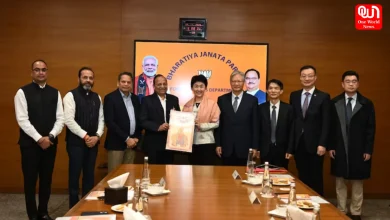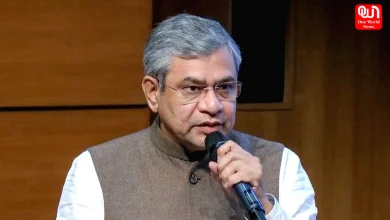A Tragic Case in Delhi: Exploring the Complexities of Relationships and Misuse of Laws
The tragic suicide of a Delhi businessman highlights the complexities of marital discord, misuse of laws, and the urgent need for mental health awareness.
The Tragic Suicide of a Delhi Businessman: Examining Marital Discord, Feminism, and the Misuse of Laws in Modern Relationships
The tragic suicide of Puneet Khurana, a Delhi-based businessman and co-owner of the popular Woodbox Cafe, has sparked a renewed debate on mental health, marital discord, and the potential misuse of laws designed to protect individuals. This heart-wrenching incident underscores the intricate interplay of personal struggles, societal expectations, and legal frameworks.

The Incident and the Cryptic Instagram Post
Manika Pahwa, estranged wife of Khurana, posted something thought-provoking on Instagram just days before his death. In her post, she was emphasizing her stand with the ideal of feminism that she described as advocating respect for all individuals irrespective of status or gender. Her now-deleted message revealed her perspective on relationships, accusing unnamed individuals of “toxicity and narcissistic abuse.” Pahwa asserted that kindness and love hold more significance than material possessions, expressing hope that her “abusers” would one day see the error of their ways.
Her words assumed a grim meaning when Khurana was found hanging in his house on New Year’s Eve. The couple, it had been said was in the process of breaking up acrimoniously, were sharing a very successfully owned business but were agonizing through personal and professional tiffs.
read more: Ensuring Safety and Security: New Year’s Eve Preparations Across Indian Cities
Allegations and Evidence
After Khurana’s death, his sister, Leena Khattar, accused Pahwa of harassment and said she had hacked Khurana’s social media accounts. Khurana reportedly recorded a 59-minute video detailing the alleged harassment he suffered, which has since circulated on social media.
As reported by Khattar, Pahwa abused him verbally and threatened to put Khurana’s parents behind bars. She reportedly teased him regarding his earlier confessions of suicide and asked him to go through with it.
Audio recordings claiming to be conversations between the two reveal heated exchanges over business differences and personal issues. Pahwa allegedly threatened financial settlements against Khurana while accusing him of disrespecting her and her family.
Bigger Picture: Abuse of Protection Laws
Again, this tragic case has reignited debates about how the laws set to protect the woman are instead misused for malicious purposes. In the Indian legal system, there are already some provisions including the Dowry Prohibition Act and Section 498A of the Indian Penal Code which are considered to address harassments and abductions related to women cases. However, it is in many cases now used to gain an upper hand or settle individual scores.
The suicide of an AI engineer named Atul Subhash earlier this month is similar. Subhash left behind an elaborate note and video before his suicide. He stated that he had been harassed by his wife and mother-in-law, who reportedly teased him, threatened him and asked for money. His suicide has also found reference among those advocating for change in the approach towards such enactments.
Systemic Problem
India’s top judiciary has acknowledged the potential for misuse of these protective laws, with one judge describing it as “legal terrorism” in extreme cases. While these laws were enacted to safeguard vulnerable individuals, their alleged misuse raises questions about achieving a balance between protection and fairness.
Critics argue that the current legal framework sometimes fails to account for the complexities of human relationships and the potential for abuse by any gender. The rising number of suicides linked to marital discord indicates a pressing need for systemic change.
Mental Health and Marital Discord
Beyond the legality, these occurrences reveal great psychological problems associated with marital conflicts. Economic, psychological abuse, and societal pressures build a toxic situation leading to outcomes so tragic as suicide.
Death at the hands of Khurana teaches a lot of open communication, professional help, and spreading awareness regarding mental health issues. Support systems should be in place when anyone is undergoing marital stress to avoid such occurrences.
Lessons and the Way Forward
The deaths of Khurana and Subhash are stark reminders of the complexities inherent in human relationships and the profound impact of emotional distress. Addressing these challenges requires a multifaceted approach:
Legal Reforms: Laws designed to protect individuals must be enforced judiciously, with safeguards against misuse. Mechanisms to ensure fairness for both parties in a dispute should be implemented.
Mental Health Awareness: Increased awareness about mental health and the availability of resources for those in distress can prevent tragedies. Counseling services and helplines should be made more accessible.
Societal Change: Conversations about respect, empathy, and equality in relationships must be normalized. Gender-neutral approaches to addressing harassment and abuse can foster a fairer society.
Support Networks: Building robust support networks for individuals undergoing personal or marital crises can provide much-needed assistance.
Conclusion
The sad incident of Puneet Khurana is a very sobering reflection of the hardships many people undergo behind closed doors. Though feminism and the battle for gender equality are essential, the misplacement of laws and the ignorance about mental health could be very lethal. Society should strive for balance and empathy with justice, fairness, and wellness on both sides without any discrimination by gender.
We’re now on WhatsApp. Click to join.
Like this post?
Register at One World News to never miss out on videos, celeb interviews, and best reads.








